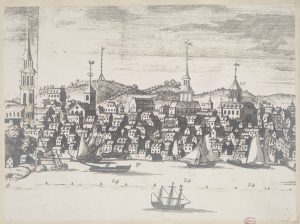 William Burgis, "Detail from a south east view of ye great town of Boston in New England in America," ca. 1722-23. Courtesy of the Boston Public Library
William Burgis, "Detail from a south east view of ye great town of Boston in New England in America," ca. 1722-23. Courtesy of the Boston Public Library
The practice of “warning out” individuals from New England communities can be traced to the mid-seventeenth century, and served as a method of pressuring (potentially troublesome) outsiders to leave town and settle elsewhere. In his Warnings Out in New England, Josiah Henry Benton explained that the roots of this practice could be found in English law. As he put it, New England settlers “necessarily brought with them the ancient and fundamental principles of the English law, one of which was that the inhabitants of a municipality were responsible for the conduct and support of each other, each for all and all for each.”[1]
To their core, New Englanders were practical, and warning out newcomers served as a way to avoid becoming responsible for potential public charges. Throughout New England, the practice, and its enforcement, differed from state to state and from community to community.
But why are these records useful? They serve as a tool for tracking the movements of individuals, particularly women and those who lived on the fringes of society. Warning out records often mention the previous community in which the individual lived, other family members, and where they were residing at present. Many of our ancestors do not appear in land, tax, vital, and probate records, and tracking their movements can be difficult. In these instances, warning out records can be particularly useful, helping us to piece together the lives of our forebears.
Most warning out records can be found within town and court records; many have been transcribed and published according to geography. Be sure to check the catalog of your local state archives, as well as the archives at your local town hall.
Here is a short list to aid you in your research!
- Alicia Crane Williams, Plymouth County, Massachusetts Warnings Out, The Mayflower Descendant, Volumes 46, 48, 49, 50.
- Alden M. Rollins, Vermont Warnings Out, Vol 1: Northern Vermont and Vol 2: Southern Vermont (Camden, Me. : Picton Press, 1995).
- Ruth Ann Wilder Sherman, Robert M. Sherman, Robert S. Wakefield, An Index to Plymouth County, Massachusetts Warnings Out from the Plymouth Court Records, 1686-1859 (Plymouth, Mass. : General Society of Mayflower Descendants, 2003).
- Warnings Out of Town, New Hampshire, microform (Concord, N.H.: Division of Records Management and Archives). Available at NEHGS Library.
- Worcester County, Massachusetts, Warnings, 1737-1788 (Worcester: Franklin P. Rice, 1899).
- Ruth Wallis Herndon, Unwelcome Americans: Living on the Margin in Early New England (Philadelphia: University of Pennsylvania Press, 2001).
- Cornelia Hughes Dayton, Sharon V. Salinger, Robert Love’s Warnings: Searching for Strangers in Colonial Boston (Philadelphia: University of Pennsylvania Press, 2014).
- Josiah Henry Benton, Warning Out in New England, 1656–1818 (Boston: W.B. Clarke Company, 1911).
- Warning out Book, 1745-1770, Boston Overseers of the Poor Records. Massachusetts Historical Society , Boston, Ms. N-1879.
Note
[1] Josiah Henry Benton, Warning Out in New England, 1656–1818 (Boston: W.B. Clarke Company, 1911), 4–5.
Share this:

About Sheilagh Doerfler
Sheilagh Doerfler joined American Ancestors in 2013. As a member of the Research and Library Services team, she works to connect patrons and members with their family histories by fulfilling research requests, providing educational programming, and writing for American Ancestors magazine and our blog, Vita Brevis. Most recently, Sheilagh has been working to uncover the names and identities of enslaved individuals as a part of the 10 Million Names Project. Sheilagh holds a B.A. from the University of Massachusetts at Amherst. Her specialties include colonial New England, New Netherland, Ireland, Atlantic Canada, Ontario, Quebec, Scandinavia, and African American research.View all posts by Sheilagh Doerfler →